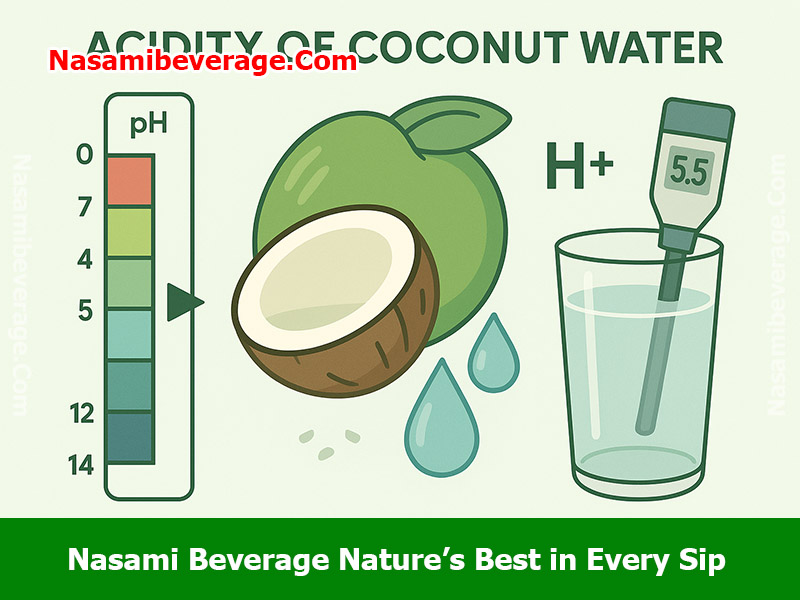Acidity of Coconut Water: What Is Its pH Level? Coconut water has surged in popularity, often hailed for its hydrating properties and natural electrolytes. As people become more conscious about what they consume and its potential effects on their health, particularly digestive health and concerns like acid reflux or the pursuit of an alkaline diet, questions naturally arise about the acidity of this tropical drink. Is coconut water acidic or alkaline? What is its actual pH level? Can drinking coconut water help or hurt if you experience heartburn or other issues related to stomach acid?
Quick Answer: Is Coconut Water Acidic, Alkaline, or Neutral?
Based on scientific measurement using the pH scale, fresh, plain coconut water is generally considered to be mildly acidic to slightly acidic. Its typical pH level falls within the range of 5.0 to 5.4. This means coconut water is positioned below 7 on the pH scale, which is the point of neutrality. Therefore, contrary to some popular beliefs, it is on the acidic side, albeit a milder acid compared to things like lemon juice or vinegar.
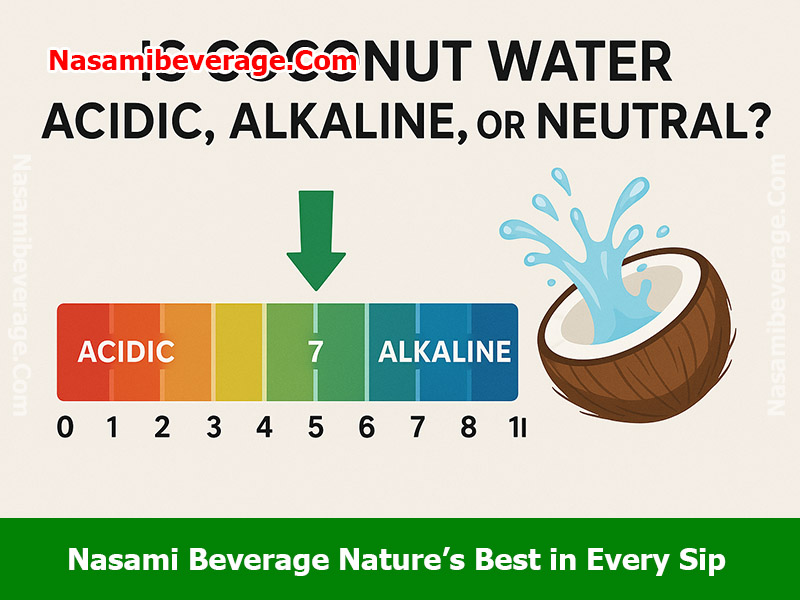
Understanding pH: The Scale of Acidity and Alkalinity
To properly understand the acidity of coconut water, it’s essential to grasp the concept of pH. pH is a measure of how acidic or alkaline a substance is. The acronym pH stands for “potential of hydrogen,” referring to the concentration of Hydrogen ions (H+) in a solution.
The pH Scale (0-14)
The pH scale ranges from 0 to 14:
- pH < 7: Indicates an acidic substance. The lower the pH, the stronger the acid. For example, battery acid has a pH near 0.
- pH = 7: Indicates a neutral substance. Pure water is typically considered neutral.
- pH > 7: Indicates an alkaline (or basic) substance. The higher the pH, the stronger the alkali. For example, lye has a pH near 14.
The pH scale is logarithmic, meaning each whole number step represents a tenfold change in acidity or alkalinity. For instance, a substance with a pH of 4 is ten times more acidic than a substance with a pH of 5, and 100 times more acidic than one with a pH of 6.
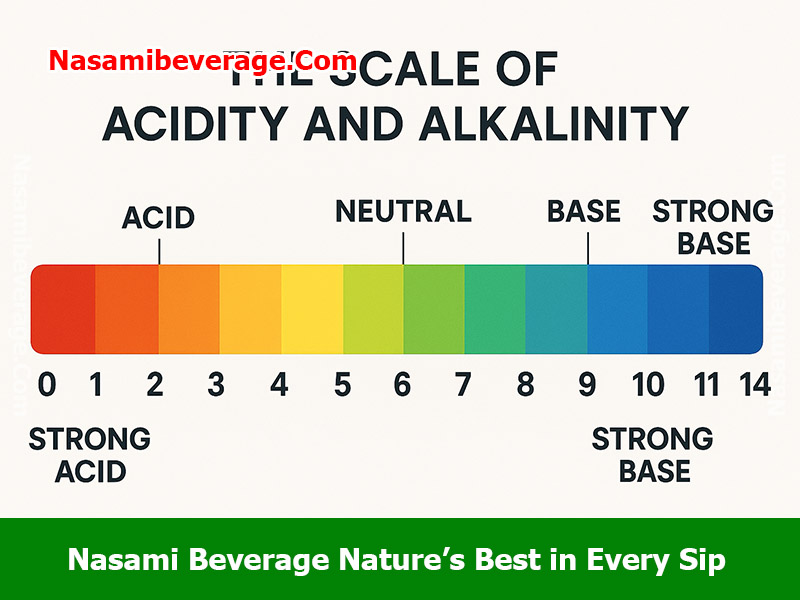
What Makes Something Acidic or Alkaline?
The pH of a solution is determined by the balance between Hydrogen ions (H+) and Hydroxide ions (OH-).
- Acidic substances have a higher concentration of H+ ions relative to OH- ions.
- Alkaline substances have a higher concentration of OH- ions relative to H+ ions.
- Neutral substances have an equal concentration of H+ and OH- ions.
When we talk about the pH of coconut water, we are measuring this balance within the water itself.
What Is The pH Level of Coconut Water? (Fresh vs. Packaged)
Determining the exact pH level of coconut water can sometimes vary slightly depending on factors like the maturity of the coconut, the soil it grew in, and whether the water is fresh or processed. However, scientific data provides a clear range.
PH of Fresh Coconut Water
For plain, fresh coconut water harvested directly from young, green coconuts, the typical pH range is reported to be between 5.0 and 5.4. This firmly places fresh coconut water in the mildly acidic category on the pH scale, closer to neutral than many common fruit juices but still below the neutral point of 7.
This natural acidity is inherent to the composition of coconut water, influenced by its mineral and organic acid content.
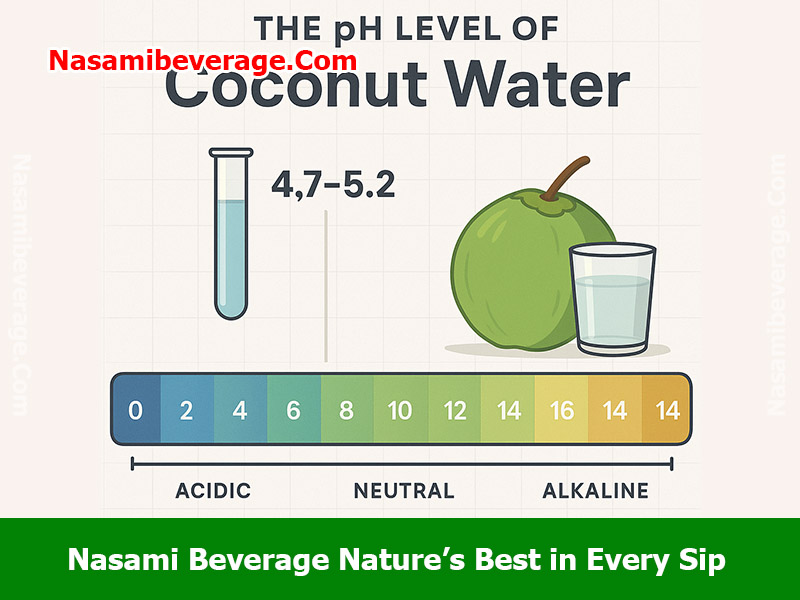
PH of Packaged or Processed Coconut Water
The pH of packaged coconut water can sometimes differ slightly from fresh due to food processing methods. Pasteurization, a common process used to extend shelf life by heating the liquid, can subtly alter the pH. Furthermore, some manufacturers may add ingredients, including acidity regulators or preservatives (like citric acid, which is highly acidic), which can impact the final pH of the product.
While these processes might cause minor fluctuations, commercially packaged coconut water generally remains within the mildly acidic range. The goal is often to maintain a pH that is stable and helps with preservation, typically still below 7. Therefore, whether fresh or packaged, the true độ pH của coconut water is not alkaline.
Debunking The Myth: Coconut Water Is NOT Highly Alkaline
Despite claims often found online, particularly within discussions around alkaline diet benefits, the assertion that coconut water is highly alkaline is a myth. As discussed, scientific measurements consistently show its pH falling within the mildly acidic range (5.0-5.4).
This misconception might stem from confusing the presence of electrolytes like potassium (which are abundant in coconut water and can have effects on the body’s overall mineral balance) with alkalinity. While electrolytes are important for hydration and various bodily functions, their presence doesn’t necessarily make the beverage itself alkaline when measured on the pH scale.
The alkaline diet theory suggests that consuming foods and drinks that are alkaline-forming after being metabolized can influence the pH of your blood and improve health. However, the scientific consensus is that the pH of food and drinks has very little impact on the pH of your blood.
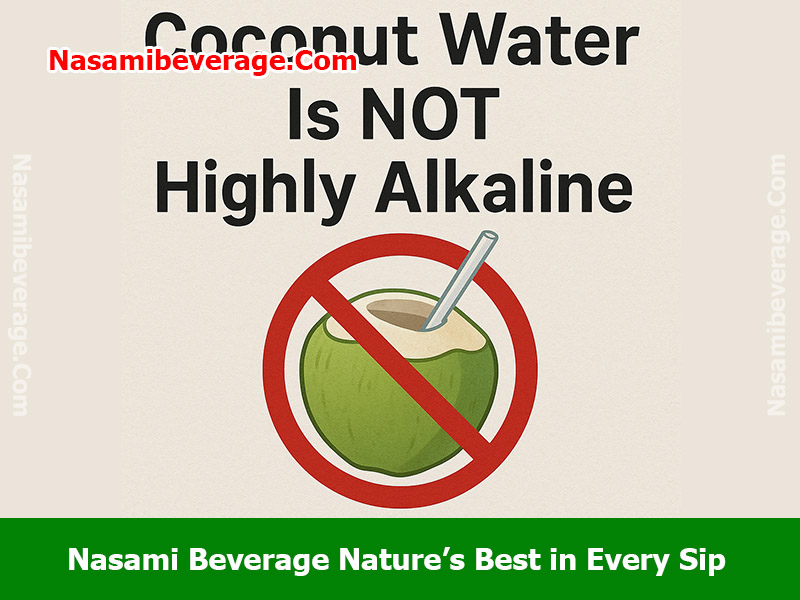
The human body has extremely effective buffering systems (primarily involving the kidneys and lungs) that work constantly to maintain the blood pH balance within a very narrow, slightly alkaline range (typically 7.35 to 7.45).
Significant deviations from this range, known as metabolic acidosis or metabolic alkalosis, are serious medical conditions not caused by the pH of your diet. While diet can influence the pH of your urine (as the kidneys excrete excess acids or bases), this is part of the body’s mechanism to maintain stable blood pH, not evidence that diet is changing blood pH itself.
Therefore, drinking coconut water, which is acidic, or even a highly alkaline substance (like alkaline water with pH 8+), will not significantly change your body’s overall acid-base balance or make your blood alkaline. The body’s robust digestive system and metabolic processes quickly buffer and neutralize what you consume to maintain homeostasis.
Coconut Water and Digestive Health (Heartburn/Acid Reflux)
Given its mildly acidic pH, some people wonder if coconut water is suitable if they suffer from acid reflux or heartburn (common symptoms of GERD – Gastroesophageal Reflux Disease), which are caused by stomach acid flowing back into the esophagus.
Stomach Acid pH vs. Coconut Water pH
The pH of your stomach acid (primarily Hydrochloric acid – HCl) is extremely low, typically ranging from 1.5 to 3.5. This makes stomach acid highly acidic, necessary for breaking down food and killing pathogens.
Comparing this to the pH of coconut water (5.0-5.4), we see that coconut water is significantly less acidic than stomach acid. When you drink coconut water, you are introducing a liquid with a much higher pH into your stomach. This can temporarily help in a couple of ways:
- Dilution: Drinking any liquid, including coconut water, can help dilute the stomach acid, making it less potent.
- Temporary pH Increase: A liquid with a pH of 5.0-5.4 can slightly raise the overall pH level within the stomach compared to just the stomach acid alone, making the stomach contents slightly less acidic.
These effects might offer some temporary relief from heartburn or acid reflux symptoms for some individuals by reducing the acidity of the stomach contents that could potentially reflux into the esophagus.

Individual Responses May Vary
It’s crucial to understand that the effect of coconut water on acid reflux and heartburn is often anecdotal and varies greatly from person to person. While its higher pH relative to stomach acid could theoretically help, other factors can influence symptoms. For example, the sugar content in coconut water might be problematic for some individuals with sensitive digestive systems.
Therefore, while some people find coconut water to be a soothing digestive health drink when experiencing heartburn, it should not be considered a universal remedy or substitute for medical treatment for conditions like GERD.
PH of Other Popular Drinks (Comparison)
To put the pH of coconut water into perspective, let’s compare it to the pH levels of some other common beverages:
- Pure Water: Neutral, pH around 7.0.
- Milk: Slightly acidic or near neutral, pH around 6.5 – 6.8.
- Coffee: Acidic, pH around 4.5 – 5.0 (similar to coconut water).
- Tea: Acidic, pH around 4.5 – 5.5.
- Orange Juice: Quite acidic, pH around 3.5 – 4.0.
- Soda/Cola: Highly acidic, pH around 2.5 – 3.0.
- Lemon Water: Very acidic, pH depending on lemon concentration, often below 3.0.
- Apple Cider Vinegar (diluted): Very acidic, pH depending on dilution, often below 3.0.
- Alkaline Water: Alkaline, pH typically 8.0 – 9.0+.
This comparison clearly shows that coconut water (pH 5.0-5.4) is far less acidic than many fruit juices or sodas, positioning it in a similar acidity range to coffee and tea, and significantly more acidic than true alkaline water. This context reinforces that it is not an alkaline beverage.

Expert View on Food pH and Body pH
Leading health professionals, including dietitians and nutritionists, emphasize that the primary focus for health should be on the overall nutritional quality of your diet, rather than strictly trying to manipulate blood pH through the pH of foods and drinks consumed. The body is remarkably good at maintaining its internal acid-base balance regardless of dietary intake.
While dietary patterns (like diets rich in fruits and vegetables) can impact metabolic load and overall health, classifying foods solely as “acidic” or “alkaline-forming” based on perceived or measured pH is an oversimplification that often leads to misinformation regarding effects on systemic blood pH.
Reliable scientific research and expert consensus confirm that consuming coconut water or any other food/drink does not significantly alter the pH of your blood.
Disclaimer: Consult a Healthcare Professional
The information provided in this article about the acidity of coconut water and its potential effects on digestive health is for general knowledge and informational purposes only, and does not constitute medical advice.
If you experience chronic heartburn, acid reflux (GERD), or any other digestive system issues, it is essential to consult with a qualified doctor or health professional (such as a dietitian or nutritionist) for proper diagnosis, advice, and treatment tailored to your individual health needs. Self-treating based on dietary pH alone is not recommended.
In summary, the science is clear: plain, fresh coconut water has a pH level typically ranging from 5.0 to 5.4, classifying it as mildly acidic to slightly acidic. Packaged coconut water may vary slightly due to processing but remains in a similar acidic range. The popular claim that coconut water is highly alkaline is a myth, contradicted by its measured pH.
Understanding the true pH of coconut water helps clarify its role in the diet. While it is less acidic than many juices or sodas, it is not alkaline and does not have the power to significantly alter your body’s overall blood pH, which is tightly regulated by internal mechanisms.
For some individuals, drinking coconut water might offer temporary relief from heartburn by helping to dilute stomach acid, but this effect is variable and not a reliable treatment for conditions like acid reflux.
Ultimately, coconut water is a hydrating beverage with beneficial electrolytes. When considering it in the context of acidity or digestive health, rely on scientific facts about its pH and understand that your body’s ability to manage acid-base balance is robust.
As always, a balanced diet and professional medical advice are key to managing digestive health and overall well-being.
